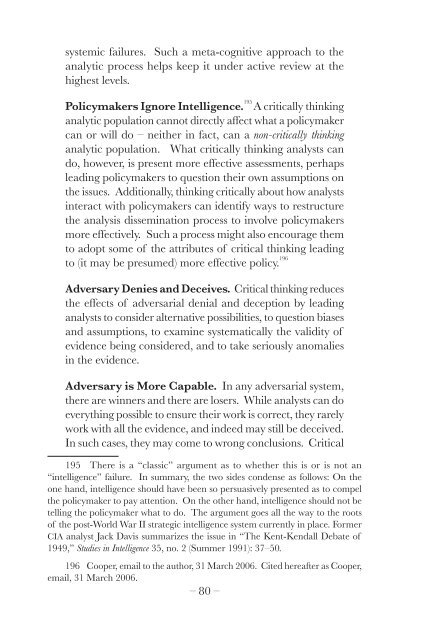Critical Thinking and Intelligence Analysis
Critical Thinking and Intelligence Analysis
Critical Thinking and Intelligence Analysis
Create successful ePaper yourself
Turn your PDF publications into a flip-book with our unique Google optimized e-Paper software.
systemic failures. Such a meta-cognitive approach to the<br />
analytic process helps keep it under active review at the<br />
highest levels.<br />
Policymakers Ignore <strong>Intelligence</strong>. 195 A critically thinking<br />
analytic population cannot directly affect what a policymaker<br />
can or will do – neither in fact, can a non-critically thinking<br />
analytic population. What critically thinking analysts can<br />
do, however, is present more effective assessments, perhaps<br />
leading policymakers to question their own assumptions on<br />
the issues. Additionally, thinking critically about how analysts<br />
interact with policymakers can identify ways to restructure<br />
the analysis dissemination process to involve policymakers<br />
more effectively. Such a process might also encourage them<br />
to adopt some of the attributes of critical thinking leading<br />
to (it may be presumed) more effective policy. 196<br />
Adversary Denies <strong>and</strong> Deceives. <strong>Critical</strong> thinking reduces<br />
the effects of adversarial denial <strong>and</strong> deception by leading<br />
analysts to consider alternative possibilities, to question biases<br />
<strong>and</strong> assumptions, to examine systematically the validity of<br />
evidence being considered, <strong>and</strong> to take seriously anomalies<br />
in the evidence.<br />
Adversary is More Capable. In any adversarial system,<br />
there are winners <strong>and</strong> there are losers. While analysts can do<br />
everything possible to ensure their work is correct, they rarely<br />
work with all the evidence, <strong>and</strong> indeed may still be deceived.<br />
In such cases, they may come to wrong conclusions. <strong>Critical</strong><br />
195 There is a “classic” argument as to whether this is or is not an<br />
“intelligence” failure. In summary, the two sides condense as follows: On the<br />
one h<strong>and</strong>, intelligence should have been so persuasively presented as to compel<br />
the policymaker to pay attention. On the other h<strong>and</strong>, intelligence should not be<br />
telling the policymaker what to do. The argument goes all the way to the roots<br />
of the post-World War II strategic intelligence system currently in place. Former<br />
CIA analyst Jack Davis summarizes the issue in “The Kent-Kendall Debate of<br />
1949,” Studies in <strong>Intelligence</strong> 35, no. 2 (Summer 1991): 37–50.<br />
196 Cooper, email to the author, 31 March 2006. Cited hereafter as Cooper,<br />
email, 31 March 2006.<br />
– 80 –
















